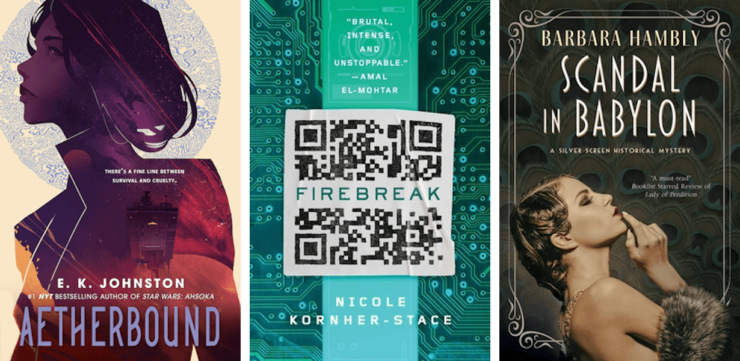Two of the books I want to talk about this time have already been ably discussed on Tor.com by Molly Templeton, whose review of Nicole Kornher-Stace’s Firebreak prompted me to get off my arse and order my copy, and of whose review of E.K. Johnston’s Aetherbound I’d be very jealous, if I were the jealous sort. But I think I can add just a little additional enthusiastic discussion…
Aetherbound is a fantastic novel. Space opera with magic, it’s large in scale, but its scope is emotional, personal, intimate. The personal side of the epic coin: what cruelty, both personal and systemic, does to the people who have to live with it, who try to survive it, and how they choose to try to overcome that cruelty. (Who they choose to be.) The novel’s whole argument is encapsulated in one line from the point of view of a woman who is desperately, grindingly trapped, in a life without affection or anything beyond the bare needs of survival, and who will not escape in life. There was no reason to revisit the cruelty done to her onto someone else, just because she could.
It’s also an absolute fuck you to Tom Godwin’s “The Cold Equations,” and the whole ethos of cruelty that lies behind the concept, which is always lovely to see.
Johnston portrays interpersonal horrors with a matter-of-fact pragmatism that never disguises just how bad things are. All three of the protagonists—Pendt and the Brannick brothers, Nell and Fisher (and there’s a half-nod to the Fisher King of Arthurian mythos in Fisher)—are trapped, each in their own way. But the odd family they end up creating together, the queer family they make, is—perhaps—a path to freedom, or at least to change. Aetherbound is a thoughtful, thought-provoking book, in conversation—in an argument—with other space operas. The difference, the distinction, between survival and cruelty is an important one, and it’s one that Aetherbound is all about.
I loved it, and I want so many more stories about these people and their world.
Survival and cruelty is also a theme that runs through Nicole Kornher-Stace’s Firebreak, a fascinating thriller set in a war-torn future where a pair of dystopian corporations control access to resources and information, and the protagonist, Mal, has hardly ever been able to conceive that her world might be different. Water is an especially dear resource, one on which the company makes a killing. One of Mal’s scrabble-for-resources gigs is streaming an online videogame which reflects the real war around her, down to the game’s high-value NPCs—who’re based on the company’s real-life supersoldiers, the faces of the war and the heart of the propaganda effort, most of whom are dead.
Mal and her streamer partner, Jessa, get sucked into some Dangerous Shit when they stumble across indications that a certain conspiracy theory might actually be real. The consequences spiral. Can their world change? And if so, what price is Mal going to pay for upsetting the powers that be?
It’s difficult to do justice to the power and sheer presence of Kornher-Stace’s writing in Firebreak, the weight and possibility of it, the anger and hope and friendship and loyalty she breathes onto the page. The world of Firebreak will eventually become the world of Archivist Wasp and Latchkey. We can know that no matter what Mal does, the future of her world contains an apocalyptic collapse and no end to the fight against cruelty, that (for those of us who remember Archivist Wasp and Latchkey) certain tragedies are inevitable. And yet. The struggle matters. Even if things only get a little better, for a little while, even if all that’s available is a moment’s grace, it matters.
A gripping, powerful, fantastic novel.
Barbara Hambly’s Scandal in Babylon isn’t SFF. Except that it’s quite possibly the magic-free AU of her 1994 Bride of the Rat God (Black Jasmine, Chang Ming, and Buttercream. A flighty starlet and her sensible, bookish war-widow sister-in-law. A mysterious murder.), which is certainly SFnal enough for me, and is first in a potential series of mystery novels set in early 1920s Hollywood.
When the ex-husband of Hollywood star Camille de la Rose—Kitty Flint to her friends—is found shot to death in her dressing room, her sister-in-law Emma Blackstone is convinced that Kitty’s being framed. But by who, and why? In corrupt and decadent Hollywood, where almost no one is exactly as they seem, there are any number of suspects and reasons. Emma doesn’t want to leave her sister-in-law to face all of this alone.
Hambly is fantastic at atmosphere. And appropriately twisty mysteries. (And character, and depth of feeling—Scandal in Babylon is haunted by the shadow of Emma’s grief, for her war-dead husband and her influenza-dead parents and family, for the academic world she left behind: all her new relationships are framed in relation to those griefs, which gives them a striking depth and colour.) And 1920s Hollywood is as peculiar a place as any science fictional otherworld. I thoroughly recommend this book.
What are you all reading lately?
Liz Bourke is a cranky queer person who reads books. She holds a Ph.D in Classics from Trinity College, Dublin. Her first book, Sleeping With Monsters, a collection of reviews and criticism, was published in 2017 by Aqueduct Press. It was a finalist for the 2018 Locus Awards and was nominated for a 2018 Hugo Award in Best Related Work. She was a finalist for the inaugural 2020 Ignyte Critic Award, and has also been a finalist for the BSFA nonfiction award. Find her on Twitter. She supports the work of the Irish Refugee Council, the Transgender Equality Network Ireland, and the Abortion Rights Campaign.










